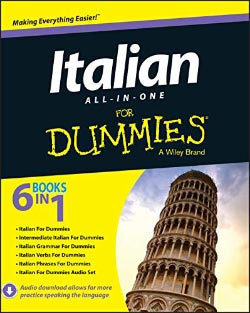The present conditional in Italian (condizionale presente) is the tense you use to introduce wishes, possibilities and suggestions, similar to the English structures would/should/could + verb.
Vorrei un caffè.
I would like a coffee.
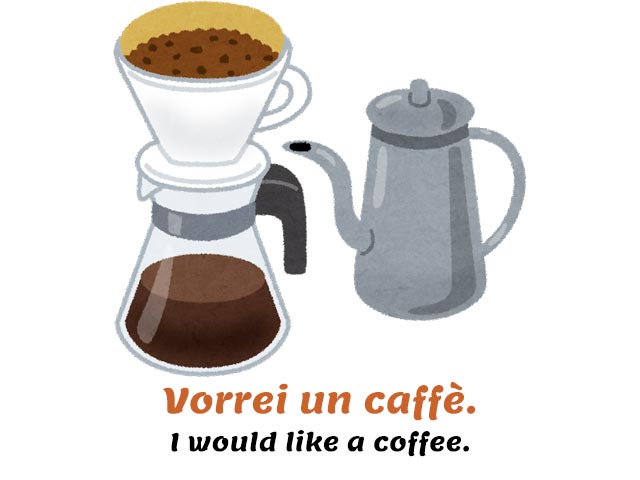
In this lesson, we will see how to form and when to use the present conditional in Italian.
Let’s get started! Iniziamo!
When do you use the present conditional in Italian?
The present conditional in Italian is commonly used in the spoken and written language to talk about wishes, possibilities, suggestions and requests.
Non comprerei quella maglietta.
I wouldn’t buy that T-shirt.
Vorrei avere più tempo libero.
I wish I had more free time.
Mio fratello non mentirebbe mai.
My brother would never lie.

Use cases of the present conditional in Italian
The present conditional in Italian is used…
… to introduce a possibility or an hypothesis.
Se avessi più soldi, andrei in vacanza.
If I had more money, I would go on vacation.
Come sarebbe la nostra vita senza elettricità?
What would our life be like without electricity?
Secondo la polizia, l’assassino avrebbe agito da solo.
According to police, the killer acted alone.
… to make a wish.
Luca vorrebbe andare al cinema.
Luke would like to go to the movies.
Vorrei tanto un cane.
I would love to have a dog.
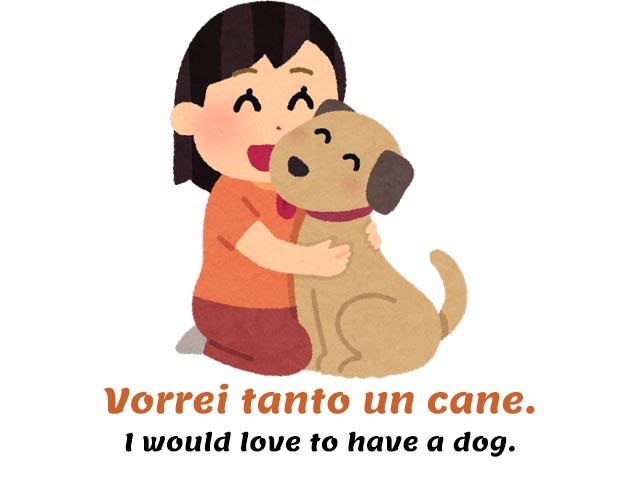
… to make a suggestion.
Dovresti dormire di più.
You should get more sleep.
Se ti annoi, potresti fare una passeggiata.
If you are bored, you could go for a walk.
… to make a polite request.
Mi passeresti il telefono?
Would you mind handing me the phone?
Vorrei un bicchiere d’acqua.
I’d like a glass of water.
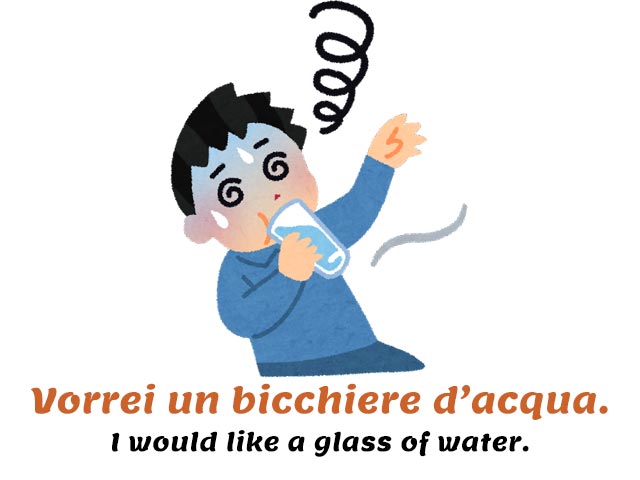
… to express a doubt.
Cosa potrei fare?
What could I do?
Cosa faresti tu al mio posto?
What would you do in my place?
… to express displeasure.
E tu chi saresti?
And who would you be?
How do you form the present conditional in Italian?
On the plus side, the present conditional in Italian is very easy to conjugate.
You just have to take the stem of the verb you want to conjugate and add these endings:
- -erei/-erei/-irei
- -eresti/-eresti/-iresti
- -erebbe/-erebbe/-irebbe
- -eremmo/-eremmo/-iremmo
- -ereste/-ereste/-ireste
- -erebbero/-erebbero/-irebbero
-ARE and -ERE verbs share the same endings. Also pay attention to the ending of the we subject pronoun because it’s very similar to the future simple ending: in the present conditional, it has a double M.
| pronoun | lavorARE | rompERE | dormIRE |
| io | lavor/erei | romp/erei | dorm/irei |
| tu | lavor/eresti | romp/eresti | dorm/iresti |
| lui/lei | lavor/erebbe | romp/erebbe | dorm/irebbe |
| noi | lavor/eremmo | romp/eremmo | dorm/iremmo |
| voi | lavor/ereste | romp/ereste | dorm/ireste |
| loro | lavor/erebbero | romp/erebbero | dorm/irebbero |
What’s the stem of a verb?
Italian verbs in the infinitive end in -ARE, -ERE and -IRE.
Cut out this part and you will be left with the root verb.
Examples:
tremare ➡️ trem-
piovere ➡️ piov-
cucire ➡️ cuc-
Italian verb endings for every tense are added to these root forms of the verb.
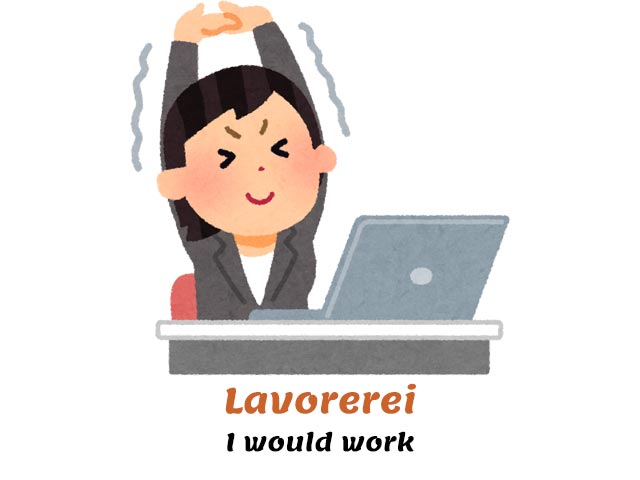
For example, you could say…
Dovrei pulire il pavimento, ma non ne ho voglia.
I should clean the floor, but I don’t feel like it.
(pulire)
Se studiassi di più, prenderesti voti migliori.
If you studied more, you would get better grades.
(prendere)
Mi presteresti una matita?
Would you lend me a pencil?
(prestare)
Ho così tanta fame che mangerei un bue!
I am so hungry I would eat an ox!
(mangiare)
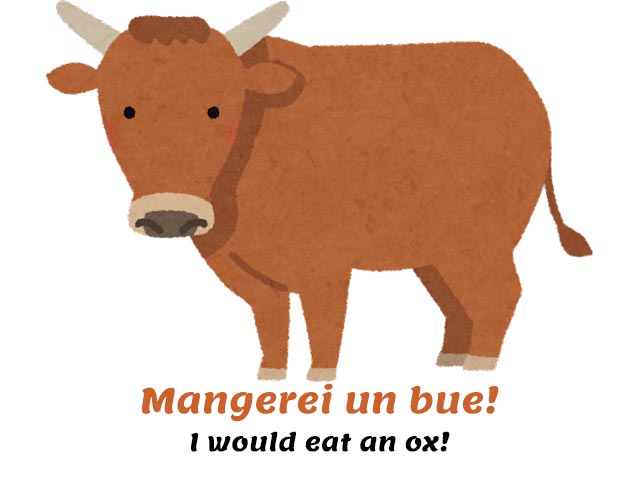
Irregular verbs in the present conditional in Italian
As you can probably imagine, essere (to be) and avere have an irregular present conditional conjugation in Italian.
| pronoun | essere | avere |
| io | sarei | avrei |
| tu | saresti | avresti |
| lui/lei | sarebbe | avrebbe |
| noi | saremmo | avremmo |
| voi | sareste | avreste |
| loro | sarebbero | avrebbero |
For example, you could say…
Sarebbe meglio rientrare.
It would be better to go back in.
Sareste così gentili da chiudere la porta?
Would you be so kind as to close the door?
Se me lo avessi detto, ti avrei aiutato.
If you had told me, I would have helped you.
Avresti un accendino?
Would you have a lighter?
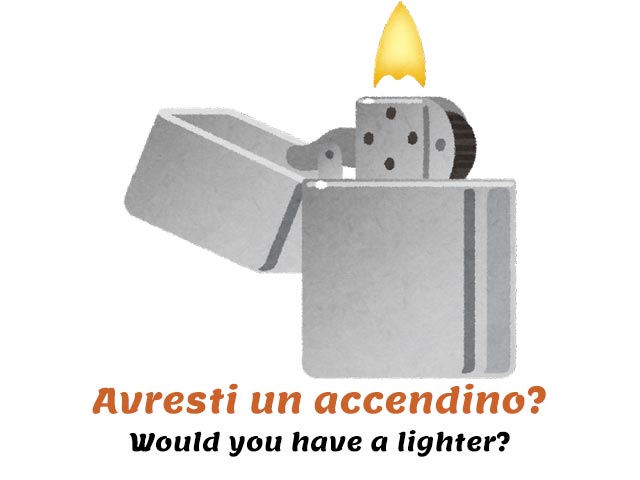
Note that all verbs ending in -CARE (giocare) and -GARE (pagare) add a -H- to all subject endings.
| pronoun | gioCARE | paGARE |
| io | giocherei | pagherei |
| tu | giocheresti | pagheresti |
| lui/lei | giocherebbe | pagherebbe |
| noi | giocheremmo | pagheremmo |
| voi | giochereste | paghereste |
| loro | giocherebbero | pagherebbero |
For example, you could say…
Giocheresti con me?
Would you play with me?
Pagherei io per tutti, ma non ho abbastanza soldi.
I would pay for everyone, but I don’t have enough money.
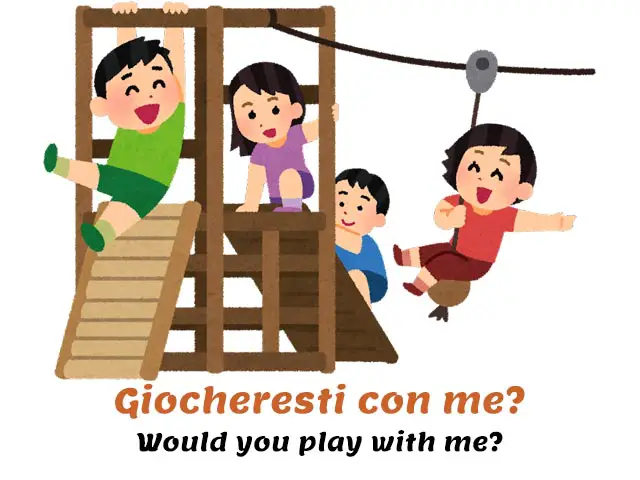
Other common irregular verbs in the present conditional in Italian are:
- andare: andrei, andresti, andrebbe, andremmo, andreste, andrebbero
- bere: berrei, berresti, berrebbe, berremmo, berreste, berrebbero
- cadere: cadrei, cadresti, cadrebbe, cadremmo, cadreste, cadrebbero
- dare: darei, daresti, darebbe, daremmo, dareste, darebbero
- fare: farei, faresti, farebbe, faremmo, fareste, farebbero
- rimanere: rimarrei, rimarresti, rimarrebbe, rimarremmo, rimarreste, rimarrebbero
- sapere: saprei, sapresti, saprebbe, sapremmo, sapreste, saprebbero
- stare: starei, staresti, starebbe, staremmo, stareste, starebbero
- tenere: terrei, terresti, terrebbe, terremmo, terreste, terrebbero
- tradurre: tradurrei, tradurresti, tradurrebbe, tradurremmo, tradurreste, tradurrebbero
- vedere: vedrei, vedresti, vedrebbe, vedremmo, vedreste, vedrebbero
- venire: verrei, verresti, verrebbe, verremmo, verreste, verrebbero
- vivere: vivrei, vivresti, vivrebbe, vivremmo, vivreste, vivrebbero
Irregular verbs DOVERE, POTERE and VOLERE
Dovere, potere and volere are very important verbs in the present conditional in Italian.
You use dovere and potere to make a suggestion. You use volere to make a request:
- dovrei (I should)
- potrei (I could)
- vorrei (I would like)
These verbs have an irregular conjugation.
| pronoun | dovere | potere | volere |
| io | dovrei | potrei | vorrei |
| tu | dovresti | potresti | vorresti |
| lui/lei | dovrebbe | potrebbe | vorrebbe |
| noi | dovremmo | potremmo | vorremmo |
| voi | dovreste | potreste | vorreste |
| loro | dovrebbero | potrebbero | vorrebbero |
For example, you could say…
Bambini, dovreste fare meno rumore mentre giocate!
Children, you should be less noisy while playing!
Potremmo andare a prendere un gelato. Che ne dici?
We could go for ice cream. What do you say?
Vorrei comprare un nuovo paio di scarpe.
I would like to buy a new pair of shoes.

The present conditional in Italian with if clauses
It’s common to see the present conditional in Italian used with an if clause. The if clause uses the subjunctive mood.
Se avessi più tempo libero, andrei in palestra.
If I had more free time, I would go to the gym.
Se Marco non fosse sempre così occupato, potrebbe venire alla festa con noi.
If Marco wasn’t always so busy, he could come to the party with us.
And that’s the end of our lesson on how to use the present conditional in Italian! If you still have any doubts about this tense, feel free to leave a comment.
What next?
Now that you’ve seen the present conditional in Italian, you might want to keep learning Italian online with these free Italian resources:
- Useful Italian Words Series
- Common Italian Phrases Series
- Italian grammar lessons and tricks
- Italian idiomatic expressions
Or you might also want an excellent offline Italian grammar resource to take with you at all times (Amazon).
Title: Italian All-in-One For Dummies
Language: English / Italian
Publisher: For Dummies
Pages: 672
Learn to speak Italian like a native? Easy.
Italian All-in-One For Dummies appeals to those readers looking for a comprehensive, all-encompassing guide to mastering the Italian language. It contains content from all For Dummies Italian language instruction titles, including Italian For Dummies, Intermediate Italian For Dummies, Italian Verbs For Dummies, Italian Phrases For Dummies, Italian Grammar For Dummies, and Italian For Dummies Audio Set.
❤️ If you liked this guide on the present conditional in Italian, consider sharing it with your social media friends who are also studying Italian.




